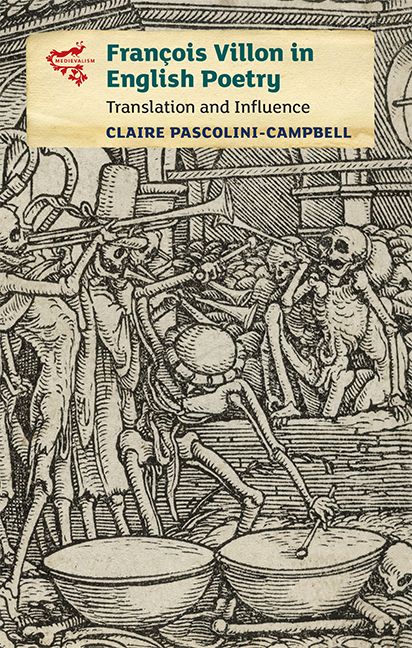Book contents
- Frontmatter
- Contents
- A Note on the Poets and the Poems
- Acknowledgements
- Introduction
- 1 Then and Now: The Legend of Villon in the Middle Ages and in Modernity
- 2 Villon and Swinburne: Finding and Singing Villon
- 3 Villon and Rossetti: Poetics of Strangeness
- 4 Villon and Pound: Modernity and the ‘Mediaeval Dream’
- 5 Villon and Bunting: Prison-Writing and Parody
- 6 Villon and Lowell: Imitation and the Visible Translator
- Conclusion
- Appendices
- Bibliography
- Index
- Medievalism
4 - Villon and Pound: Modernity and the ‘Mediaeval Dream’
Published online by Cambridge University Press: 09 October 2019
- Frontmatter
- Contents
- A Note on the Poets and the Poems
- Acknowledgements
- Introduction
- 1 Then and Now: The Legend of Villon in the Middle Ages and in Modernity
- 2 Villon and Swinburne: Finding and Singing Villon
- 3 Villon and Rossetti: Poetics of Strangeness
- 4 Villon and Pound: Modernity and the ‘Mediaeval Dream’
- 5 Villon and Bunting: Prison-Writing and Parody
- 6 Villon and Lowell: Imitation and the Visible Translator
- Conclusion
- Appendices
- Bibliography
- Index
- Medievalism
Summary
IF IT WAS SWINBURNE who had discovered Villon for the Pre-Raphaelites and Parnassians, it was Ezra Pound (b. 1885–d. 1972) who would bring him to the attention of Modernist and Postmodernist poets, negotiating the presence of his Victorian precursors while simultaneously paving the way for new interpretations of Villon and a new mode of quasi-translation he referred to as ‘personae’. Pound is thus a central figure in the English tradition of translating Villon, and the influence of the French poet on his work is felt across his varied career as critic, poet, political activist and composer, with Villon being carried across not merely linguistic boundaries, but generic ones too. He first appears in two ‘Villonauds’, imitative rhymed poems which reproduce the style, themes, and to some extent the form of the original poetry, published originally in A Lume Spento (1908) and later in Personae: The Collected Shorter Poems of Ezra Pound (1926). In 1910 Pound devoted an entire chapter to the medieval poet in his critical text, The Spirit of Romance, an anthology that also includes studies of the work of Arnaut Daniel, Guido Guincelli, Dante, Petrarch, Boccaccio, Chaucer, John Gower, Michael Agnolo, Camoens, Lope de Vega, and Shakespeare. In addition, Pound set Villon to music in his 1924 opera The Testament, which was later adapted for BBC radio as a melodrama, in 1931. Finally, it is significant that The Cantos are dense with allusions to Villon, as his presence in this modern epic, a text that was to occupy Pound from 1924 until his death in 1972, is emblematic of the central role that Villon came to play in Pound's mission of re-evaluating and revising the Western canon.
This role, as the following chapter will demonstrate, centres on a social historical reading of Villon as the last medieval poet, with his oeuvre as the juncture at which pre-modern literature becomes modern. In his 1934 critical treatise, ABC of Reading, Pound explains: ‘if Chaucer represents the great mellowing and the dawn of a new paideuma, Villon, the first voice of man broken by bad economics, represents also the end of a tradition, the end of the mediaeval dream’.
- Type
- Chapter
- Information
- François Villon in English PoetryTranslation and Influence, pp. 85 - 113Publisher: Boydell & BrewerPrint publication year: 2018

